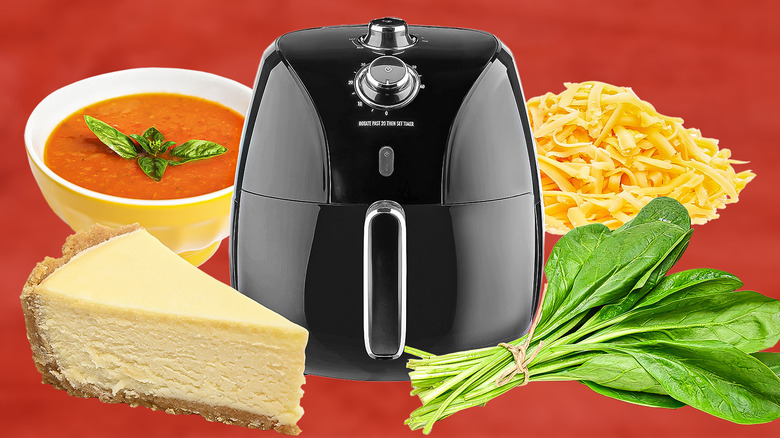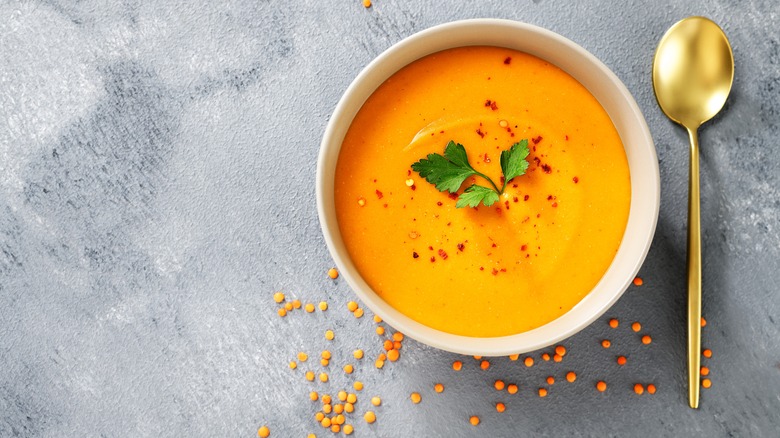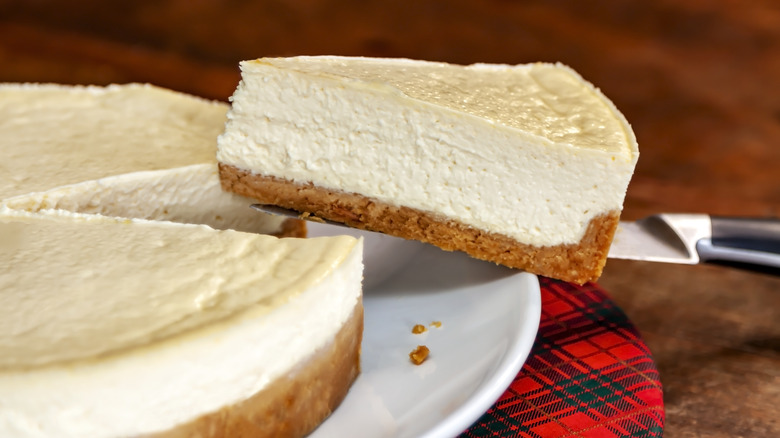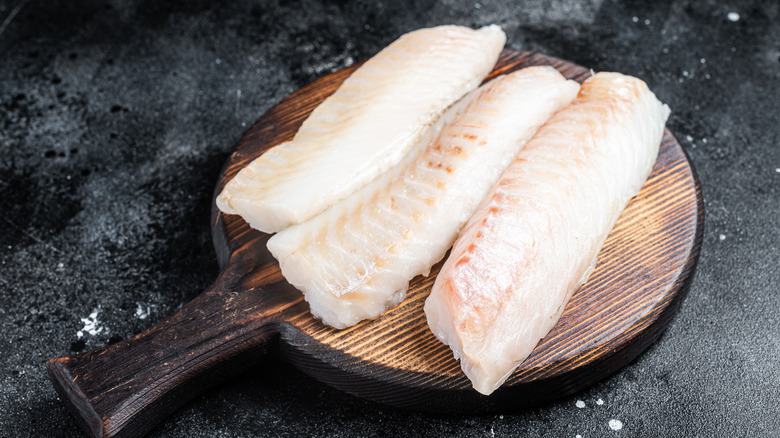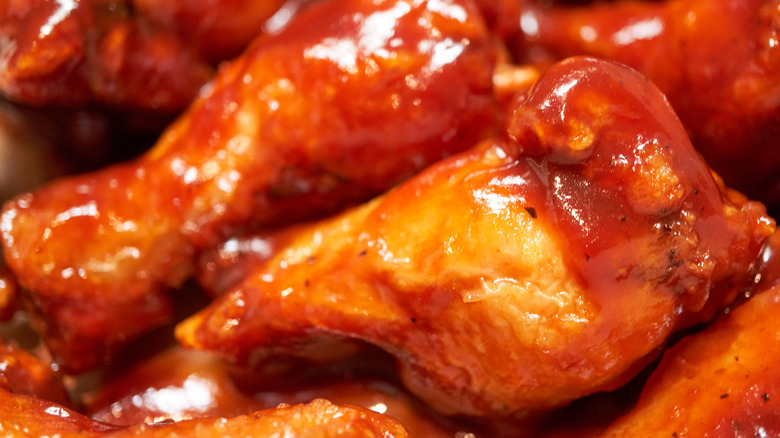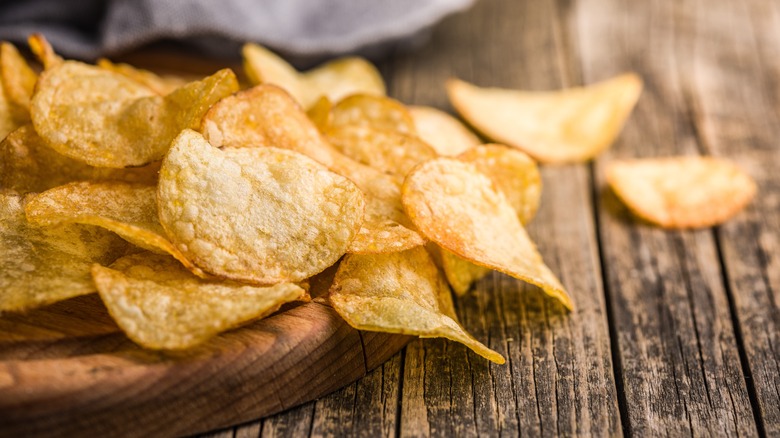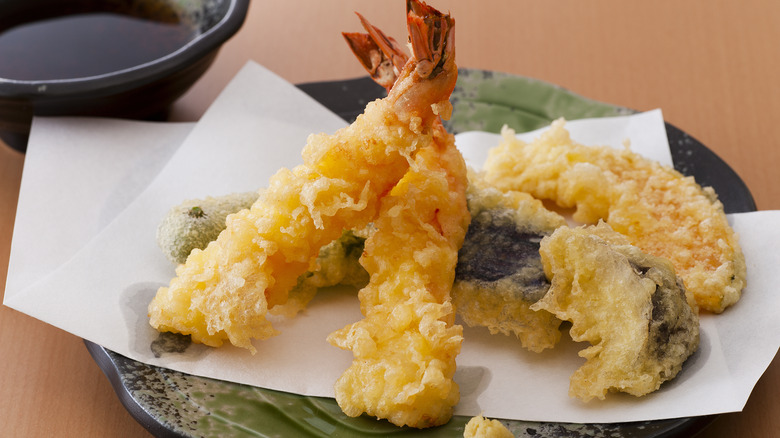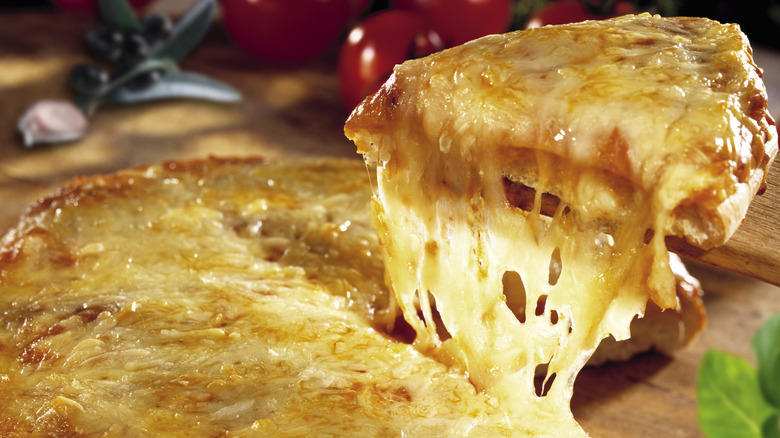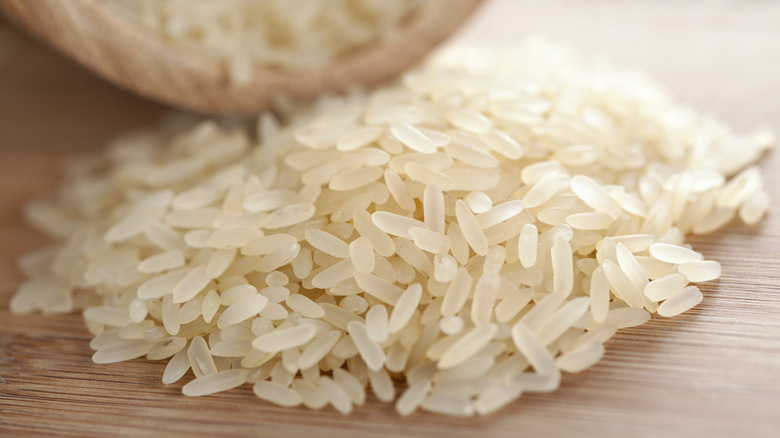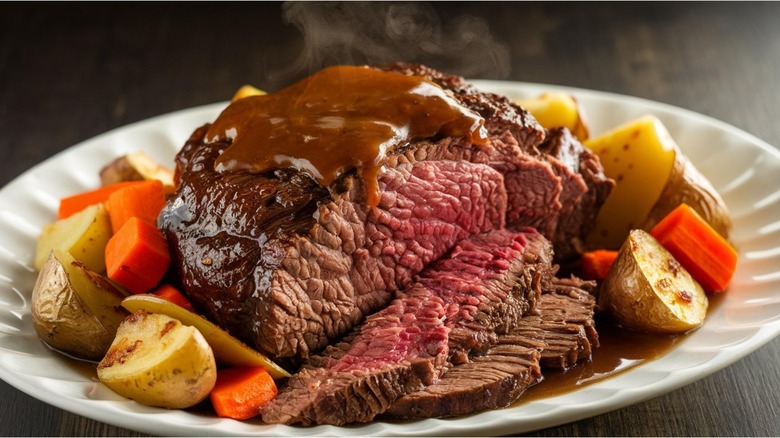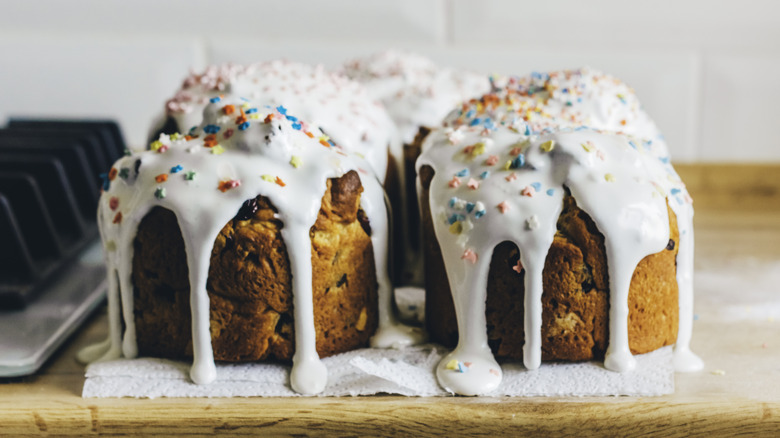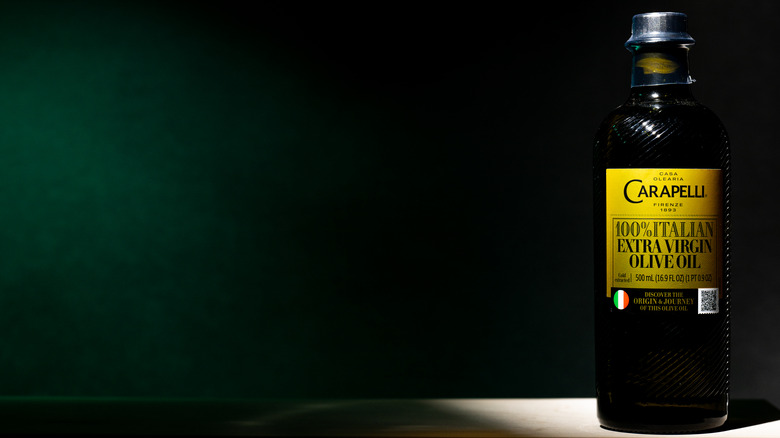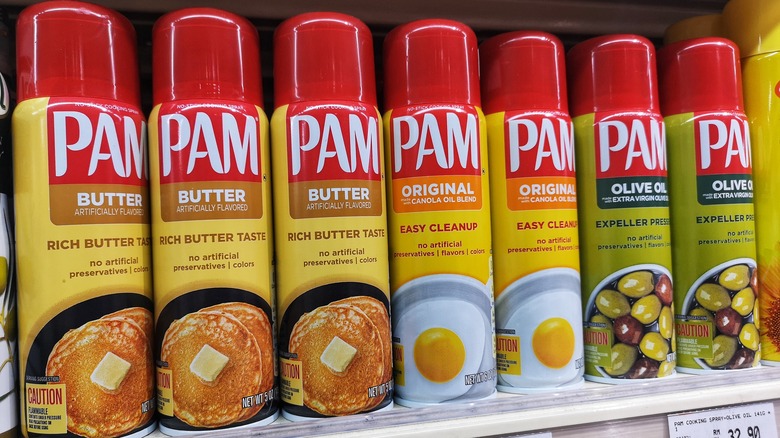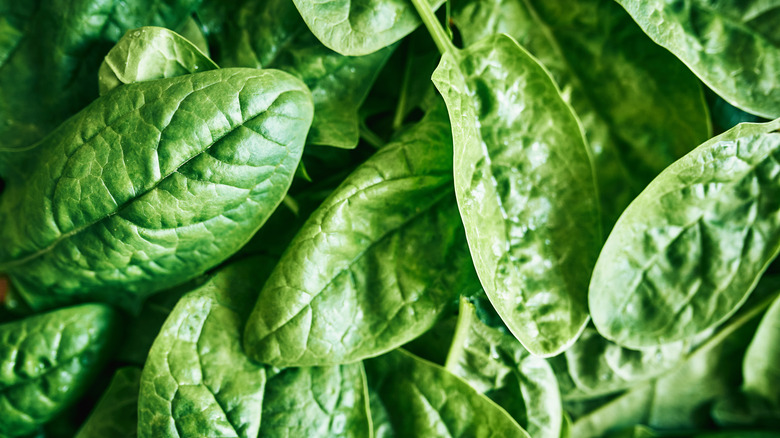Common Foods You Should Keep Far Away From The Air Fryer
The air fryer has quickly become a kitchen staple, celebrated for delivering that delicious crispy, fried texture with far less oil. While it's convenient, versatile, and easy to use, it's not the ideal tool for every type of food. As Emily Paster, author of "Epic Air Fryer Cookbook," wisely notes, "If it's not the right appliance for the job, just don't do it! When I was writing 'Epic Air Fryer,' I looked at fried foods from around the world and adapted them for the air fryer. But I avoided any wet batters, for example. So, I have a great fish taco recipe, but the fish is breaded with panko bread crumbs, not a beer batter." Understanding the air fryer's limitations — especially with foods that don't crisp up well or that can easily become overcooked and dry — will help you avoid soggy, burnt, or downright disappointing results.
In this guide, we'll explore some common foods that shouldn't go anywhere near your air fryer. Specifically, we'll highlight common foods and explain why they're better suited for other cooking methods, based on insights from culinary experts. By knowing these exceptions, you'll keep your air-frying adventures delicious and frustration-free.
Soups and stews
"Anything with liquid is not a good candidate for air frying. So, no soups or stews. The liquid would blow around and spill," advises Emily Paster. This is because air fryers are designed for cooking foods with minimal moisture, and the rapid airflow can cause liquids to splash and spill. Hot liquids splashing around in an air fryer can easily pose safety risks, like burns or accidental spills that could damage your countertops or appliances.
The lack of moisture retention in an air fryer can also lead to uneven cooking, as it's not equipped to handle the slow, steady heat needed for these dishes. Soups and stews require controlled heat and a sealed environment to simmer and develop flavors, which is exactly what the air fryer lacks. Instead, these dishes are better suited to the stovetop or slow cooker, where liquids can heat evenly and won't be affected by the constant motion of air. What this chalks up to is this: for a comforting bowl of soup or a hearty stew, it's best to skip the air fryer and stick with methods designed for liquid-based cooking.
Cheesecake
Cheesecakes and other similar desserts rely on a moist, controlled environment to achieve the smooth, creamy texture they're known for. That's why putting cheesecake in an air fryer is bad news. "Anything that does better in a moist or steamy environment would not work well because the air fryer is a hot and dry environment," explains Emily Paster. "Instant Pots and other pressure cookers are great for cooking cheesecakes and custards," as they create a sealed, humid environment.
Ken Tobby, an organic food scientist and CEO of the blog Organic Solace, echoes this sentiment. "In an air fryer, delicate desserts that depend on low-temperature, slow baking to achieve a smooth, creamy consistency might get ruined. The extreme heat may cause them to curdle or cook too rapidly on the inside, leaving them undercooked on the outside," notes Tobby.
Cheesecake is a dessert that requires patience and precision, with gradual heat being key to achieving the right texture. Attempting to rush this process in an air fryer compromises not just the consistency, but also the overall flavor, resulting in a dessert that lacks the signature creaminess.
Thin, delicate cuts of meat
When cuts of meat are thin or especially lean, they become pretty delicate, making them less than ideal for the air fryer. The air fryer's rapid, intense heat can quickly dry out these proteins. "I would avoid thin cuts of fish or chicken, unless they have been battered with bread crumbs," shares Emily Paster. Without the barrier of the batter to seal in their juices, the air fryer's high temperature and dry heat can dehydrate these cuts in minutes, leaving you with tough, overcooked meat.
Fish fillets like cod, sole, and tilapia are particularly vulnerable because of their low fat content, meaning they have less natural moisture to protect them from the intense heat. In the air fryer, they can lose their tenderness and "get quickly dehydrated," adds Ken Tobby. Even with breadcrumbs or batter, you may still be taking a risk by cooking them in an air fryer. For the best results with these types of meats, it's usually better to rely on methods like pan-searing or grilling, which allow for more control over temperature and moisture.
Saucy or marinated foods without batter
Foods that are heavily drenched in sauces or marinades aren't quite right for an air fryer. The strong air circulation can cause the sauce to blow off the food, leaving behind a mess and unevenly flavored dishes. The sauce might also drip through the basket, causing your food to stick to the fryer's surface. As Emily Paster explains, "In my book, I have a recipe for General Tso's chicken, but I cook the chicken pieces in the air fryer and then toss them in the sauce afterward — I don't try to cook them in the air fryer with that thick sauce"
Heavily marinated foods face a similar issue, especially if they're soaked in oil or liquids. Oily marinades can even cause flare-ups, making them a potential safety hazard. A good workaround if you're set on air frying marinaded protein or veggies is to toss them in a dry batter to help keep everything intact during cooking. "For example, I might marinate chicken tenders or pieces of fish but then they would be battered, which would prevent any of the marinade from being blown off," says Paster. She does make the caveat that "sticky, brushed-on sauces do okay," as they tend to adhere better to the food during cooking without creating a mess. Her recipe for chicken breasts brushed with peach-mango jam turns out great in the air fryer. "The jam sticks to the chicken and gets nicely caramelized."
Homemade chips
Making homemade potato or kale chips in the air fryer may sound convenient, but it rarely delivers great results. Lightweight ingredients like thinly sliced potatoes can't stand up to the air fryer's powerful fan. "I have tried to make homemade potato chips or kale chips in the air fryer, but I find that they tend to blow around," says Emily Paster. "Even homemade tortilla chips with cut-up tortillas are tricky." Unfortunately, what you'll end up with are unevenly cooked chips, with some pieces burning while others may not cook enough.
Fanila Nawaby, the chef and owner of Mimi's Kabob, also advises skipping the air fryer for making chips. Instead, "It's best to use a conventional oven." This will provide a more even cooking process and a much tastier outcome. That being said, don't let this advice steer you away from putting potatoes in an air fryer altogether. It's just that "you're better off with wedges or thick-cut fries," adds Paster.
Wet batters
"Most kinds of wet batters are not good for the air fryer," according to Emily Paster. "Because of the name 'air fryer,' people want to be able to cook things like tempura or beer-battered fish in an air fryer, but they don't work well. The strong fan tends to blow off the wet batter and it makes a huge mess." What you'll likely end up with food-wise is a soggy, uneven crust rather than the crunch and texture you're expecting. Plus, you can expect a whole lot of cleaning.
Tobby echoes this sentiment, pointing out that the batter in an air fryer doesn't crisp up properly, making traditional deep frying the more reliable option. The key problem is that the air fryer's rapid heating doesn't allow the batter to set before it's exposed to direct airflow. So, while breaded items are great for cooking in an air fryer, foods with wet batter just don't have the same success.
Cheese
Cheese is one of the most delicious food inventions ever created, but that doesn't mean you should put it in an air fryer. Emily Paster warns, "Watch out for melting cheese, which can stick to the air fryer basket and make a mess and burn." That means dishes like pizza and lasagne are definitely off-limits. If you just can't help yourself from putting cheese in an air fryer, Paster says to "cook one side first without cheese, then flip the food over, add the cheese, and cook it on top of the food only." Another suggestion would be to make sure the cheese is really frozen and tightly sealed inside the food, though it's still a risk. Ultimately, you're better off using a method that allows for more controlled heat.
Foods that are primarily made of cheese, like mozzarella sticks or grilled cheese sandwiches, often suffer in the air fryer due to the intense heat. Fanila Nawaby warns, "The cheese tends to ooze out before the outer layer crisps up." Ken Tobby further emphasizes the issue, explaining that "instead of getting that perfect crisp golden outside, they become a sloppy puddle." In the end, while cheese may seem tempting to toss into an air fryer, it's probably best not to.
Raw grains
Air fryers excel at cooking many foods, but raw grains aren't among them. As Fanila Nawaby points out, "Rice, pasta, and other grains need to be boiled or steamed before they can be air-fried. Attempting to cook them from raw in an air fryer will leave you with hard, inedible grains." This is because the dry heat of the air fryer doesn't penetrate raw grains effectively, resulting in a texture that's far too tough to eat.
When pre-cooked, grains can still be tricky to manage in an air fryer. Ken Tobby mentions that he's done some experimenting, and "even cooked rice can turn out to be extremely dry" after air frying. The air fryer crisps up the exterior and often leaves grains devoid of moisture, making them notably unpleasant to eat. To get the results you're looking for with grains, stick to traditional methods like boiling and steaming to retain their ideal mouthfeel and flavor.
Whole roasts
Air fryers are great for small portions, but when it comes to whole roasts or larger cuts of meat, they really fall short. "It's not a great tool for foods that do better being cooked low and slow or in liquid, like a brisket, pot roast, or other tough cuts of meat," explains Emily Paster. The rapid, high heat of an air fryer isn't conducive to breaking down tough cuts of meat that require time to become tender.
Fanila Nawaby agrees. "Large cuts of meat or whole chickens often cook unevenly in an air fryer," Nawaby says. The outer layer may overcook while the inside remains raw, which is especially dangerous when chicken is involved. Simply put, an air fryer just isn't equipped to handle cooking whole roasts, where thorough, slow heat is essential for breaking down connective tissues and ensuring tenderness throughout. You'll be much better off braising a whole roast or using a conventional oven.
Glazed foods
Ken Tobby warns that foods with sugary glazes "can burn faster in an air fryer." The high heat will often caramelize the sugar too quickly, leading to a burnt flavor rather than the desired golden-brown finish. Emily Paster adds, "I would be careful air-frying items with a glaze because, like a wet batter, the strong fans of the air fryer could blow it off." That means you could end up with a sticky mess of an air fryer basket when it's all said and done, and that's no fun.
In general, if you're aiming to air fry something with a glaze, it's usually best to apply the glaze after cooking, ensuring that the dish doesn't dry out or burn during the process. "I have lots of fun recipes for desserts in my book like donuts and other 'fried' confections, but I always apply the glaze or other toppings like pearl sugar after they come out of the air fryer," says Paster.
Extra-virgin olive oil
Not all oils are suitable for the high heat of an air fryer, and extra-virgin olive oil falls into that category. As Paster explains, "Air frying is typically done at a high heat, so I don't recommend using extra virgin olive oil or other fats with a low smoke point." These oils tend to degrade at the temperatures required for air frying, resulting in a burnt, bitter flavor.
Instead, opt for oils with higher smoke points like vegetable oil or grapeseed oil. which can withstand the intense heat of the air fryer without burning. The result will be a better overall cooking experience and flavor. Avocado oil also has an impressively high smoke point and a subtle flavor that complements a variety of dishes. Plus, it offers the added benefit of being rich in healthy fats, making it an excellent air frying choice for both taste and health.
Nonstick sprays
Nonstick sprays are a handy tool in the kitchen, but you probably should not let them go anywhere near your air fryer. "Nonstick sprays like Pam contain chemicals that could damage the nonstick coating of the air fryer basket. I avoid them," notes Emily Paster. Over time, these chemicals can break down the coating, leading to food sticking and making cleanup a real hassle. Worse, the coating could even end up in your food. Yikes.
Speaking of chemicals, nonstick sprays aren't exactly the healthiest option either. More often than not, they're full of additives that you'd be better off avoiding anyway. Instead, when you want to lightly coat your air fryer basket, consider using an oil sprayer and filling it with a high-smoke-point oil, like avocado oil. This not only keeps your air fryer in top shape but also helps you apply just the right amount of oil to your dish.
Leafy greens
Air-frying leafy veggies like spinach or collard greens is not the best idea. Because they're so lightweight, they can "easily fly around inside the air fryer, leading to uneven cooking or even burnt leaves," notes Fanila Nawaby. It's the high-speed air circulation of air fryers that causes this issue. The leaves just won't stay in place. Plus, they're very thin, so the high temperature inside an air fryer can fully dehydrate them before you know it.
Ken Tobby adds that leafy greens "often result in a scenario of dried-out crumbs instead of crispy goodness." If you're dead set on putting leafy greens in your air fryer, there is one way to potentially do it without utter failure. Use a high-smoke-point oil to both weigh them down a bit and add some moisture (trust us, they wouldn't survive without it). However, you have to be careful, because if you add too much oil, it could end up blowing around inside the air fryer, leaving you with a mess to clean up and unevenly air-fried greens.
